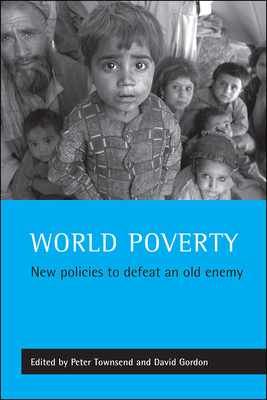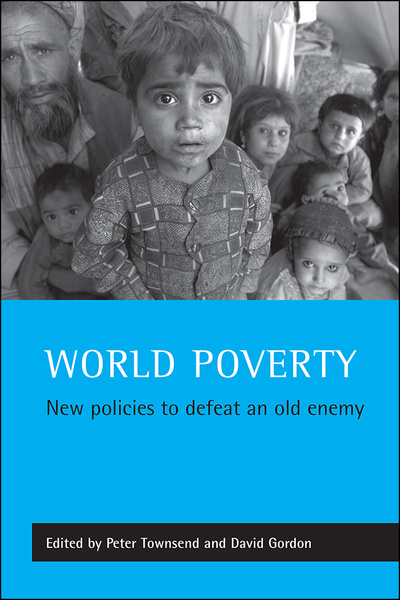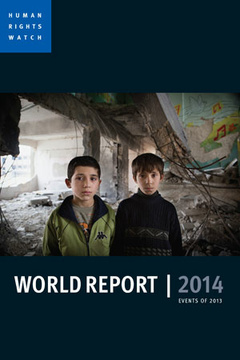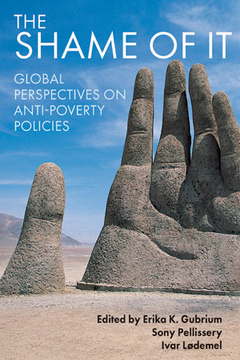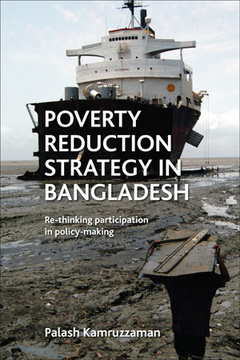Published
Sep 25, 2002Page count
480 pagesBrowse the series
Studies in Poverty, Inequality and Social ExclusionISBN
978-1861343956Dimensions
234 x 156 mmImprint
Policy PressWorld poverty is an important book offering fresh insights into how to tackle poverty worldwide. With contributions from leading scholars in the field both internationally and in the UK, the book asks whether existing international and national policies are likely to succeed in reducing poverty across the world. It concludes that they are not and that a radically different international strategy is needed.
This book is a companion volume to Breadline Europe: The measurement of poverty (The Policy Press, 2001). The focus of World poverty is on anti-poverty policies rather than the scale, causes and measurement of poverty. A wide range of countries is discussed including countries such as China and India, which have rarely been covered elsewhere.
The interests of the industrialised and developing world are given equal attention and are analysed together. Policies intended to operate at different levels - international, regional, national and sub-national - ranging from the policies of international agencies like the UN and the World Bank through to national governments, groups of governments and local and city authorities - are examined. Key aspects of social policy, like 'targeting' and means-testing, de-regulation and privatisation, are considered in detail.
World poverty will become a definitive point of reference for anyone working, studying or researching in the poverty field.
Studies in poverty, inequality and social exclusion series
Series Editor: David Gordon, Director, Townsend Centre for International Poverty Research.
Poverty, inequality and social exclusion remain the most fundamental problems that humanity faces in the 21st century. This exciting series, published in association with the Townsend Centre for International Poverty Research at the University of Bristol, aims to make cutting-edge poverty related research more widely available.
For other titles in this series, please follow the series link from the main catalogue page.
"The great value of this collection is that it tackles the complexities of international poverty analysis head on. The authors leave us with the inspiration to pursue a clear and ambitious research agenda and the campaigners amongst us may well be spurred on by the Manifesto for International Action to Defeat Poverty laid out in the Appendix. World Poverty is essential reading for social policy students and scholars." SPA News
"This publication will make a valuable contribution to the integration of human rights values into world poverty reduction strategies. The authors provide concrete suggestions on how to translate human rights norms, such as the right to social security, the right to an adequate standard of living, the rights of the child, the right to health and the right to education, into effective anti-poverty strategies." Mary Robinson, United Nations High Commissioner for Human Rights
Peter Townsend was Professor of International Social Policy at the London School of Economics and Political Science, and Acting Director of the Centre for the Study of Human Rights there until his death in June 2009. He was also Emeritus Professor of Social Policy at the University of Bristol.
David Gordon is Director of the Townsend Centre for International Poverty Research at the University of Bristol.
Part I: International anti-poverty policy: the problems of the Washington Consensus Poverty, social exclusion and social polarisation: the need to construct an international welfare state ~ Peter Townsend; Is rising income inequality inevitable? A critique of the 'Transatlantic Consensus' ~ Tony Atkinson; The international measurement of poverty and anti-poverty policies ~ David Gordon
Part II: Anti-poverty policies in rich countries Social policy in the US: workfare and the American low-wage labour market ~ S.M. Miller and Jeanette E. Markle; A European definition of poverty: the fight against poverty and social exclusion in the member states of the European Union ~ Bernd Schulte; Welfare state solidarity and support: the Czech Republic compared with the Netherlands ~ Tomáš Sirovátka, Wim van Oorschot and Ladislav Rabušic; Targeting welfare: on the functions and dysfunctions of means testing in social policy ~ Wim van Oorschot;
Part III: Anti-poverty policies in poor countries: Structural adjustment and mass poverty in Ghana ~ Kwabena Donkor; Social funds in sub-Saharan Africa: how effective for poverty reduction? ~ Nazneen Kanji; Urban water supply, sanitation and social policy: lessons from Johannesburg, South Africa ~ Jo Beall, Owen Crankshaw and Susan Parnell; Round pegs and square holes: mismatches between poverty and housing policy in urban India ~ Sunil Kumar; Urban poverty in China: incidence and policy responses ~ Athar Hussain; 'A new branch can be strengthened by an old branch': livelihoods and challenges to inter-generational solidarity in South Africa ~ Jo Beall;
Part IV: Future anti-poverty policies: national and international: Human rights, transnational corporations and the World Bank ~ Peter Townsend; Are we really reducing global poverty? ~ Jan Vandemoortele; 1% of €10,000 billion ~ Tony Atkinson; Conclusion: constructing an anti-poverty strategy ~ Peter Townsend and David Gordon.







